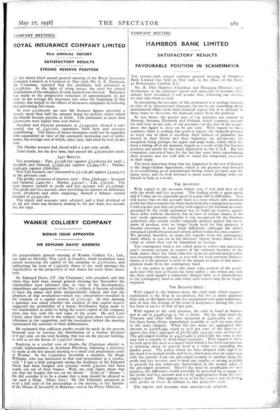COMPANY MEETING
HAMBROS BANK LIMITED
SATISFACTORY RESULTS FAVOURABLE POSITION IN SCANDINAVIA THE twenty-sixth annual ordinary general meeting of Hambros Bank Limited was held on May 19th, at the offices of the Bank, 41 Bishopsgate, London, E.C.
Mr. R. Olaf Hambro, Chairman and Managing Director, said : Gentlemen, as the directors' report and statement of accounts have already been circulated, I will assume that, following our CUSWITI, we may take them as read.
In presenting the accounts of this institution it is perhaps natural, in view of its international character, for me to say something about international affairs from their financial aspect, but it is difficult in these times to dissociate the financial aspect from the political.
As you know, the greater part of our activities are centred in Norway, Sweden, Denmark and Finland, which countries account for well over 50 per cent. of our accounts—in the case of the accept- ances the figure is close on 6o per cent. With regard to the -A: countries there is nothing but good to report, the financial position in every one of them is excellent, their balance of payments has moved in their favour and their industries are prosperous, the exception being perhaps the paper and pulp trade, where there has been a falling off of the demand, largely as a result of the Far Eastern position and partly by the trade depression in the U.S.A. But the companies concerned have for the last few years been consolidating their position and are well able to stand the temporary recession in their trade.
The most important thing that has happened in the rest of Europe is the Anglo-Italian Agreement, which is the greatest step forward in re-establishing good international feeling which we have seen for many years, and we look forward to more active dealings with our friends in Italy as a result.
THE ACCOUNTS
With regard to the accounts before you I will deal first of all with the profit and loss account. The trading profit is again good, and if I may say so, especially good in a year full of difficulties. You will notice that on this account there is a note which calls attention to the fact that a transfer has been made from the contingency account. I told you last year that our policy with regard to the German accounts governed by the credit agreement was to build up reserves against these debts without allocation, but in view of certain clauses in the new credit agreement, whereby it was recognised by the German authorities that certain credits originally granted against the move- ment of produce were no longer being used for that purpose, it became necessary to treat them differently (although the debtor remained a perfectly good and solvent debtor within his own country). We decided, therefore, to make this transfer from the contingency fund, which, as you see in the directors' report, brings them to the value at which they can be liquidated in sterling.
The contingency fund is not called upon to relieve any particular year's revenue account in respect of the ordinary business of the bank, unless there has been some loss of an exceptional and possibly non-recurring character, and, as you will see from previous balance- sheets, it is the practice to refer in the annual accounts to any appro- priation made from the contingency fund.
It is our policy to add to this fund some portion of the profits each year (this year £170,000 has been added) ; also where any sum has been used against a temporary illiquid debt, it is retransferred to the contingency fund as and when such reserve may be no longer required.
THE BALANCE-SHEET
With regard to the balance-sheet, the chief item which requires explanation is the drop in acceptances, but this is more apparent than real, as the figure last year was exceptional and quite temporary, and, in fact, the average of the total of acceptances during this year has been in excess of that of last year.
With regard to the cash position, the cash in hand at bankers and at call at £4,983,144 os. 6d. is down. On the other hand the Treasury and other bills have increased at £4,625,805 I IS. 2d., but these being always immediately available as cash we treat them in the same category. When the two items are aggregated they amount to £9,608,949, equal to 55.8 per cent. of the deposits as against last year's aggregate of 48,761,382, 54.4 per cent. of deposits. The gilt-edged holding at £4,220,46o is practically the same as last year and is entirely in short-dated securities. With regard to these we look upon this asset as a liquid fund which it has been our practice to maintain about its present level at a value not exceeding the market price. The policy which we have adopted with regard to this fund is to exclude profits and losses which may arise in connexion with the transfer from one gilt-edged security to another from the profit and loss account, and to keep any surplus so arising available to provide for any temporary depreciation in the market value of the gilt-edged securities. Should the fund be insufficient for that purpose, the difference would normally be provided by a charge On the profit and loss account and not by appropriation from the con- tingency fund. This appears to us to be the correct way of dealing with profits or losses in relation to this particular asset.
The reports and accounts were unanimously adopted.


















































 Previous page
Previous page